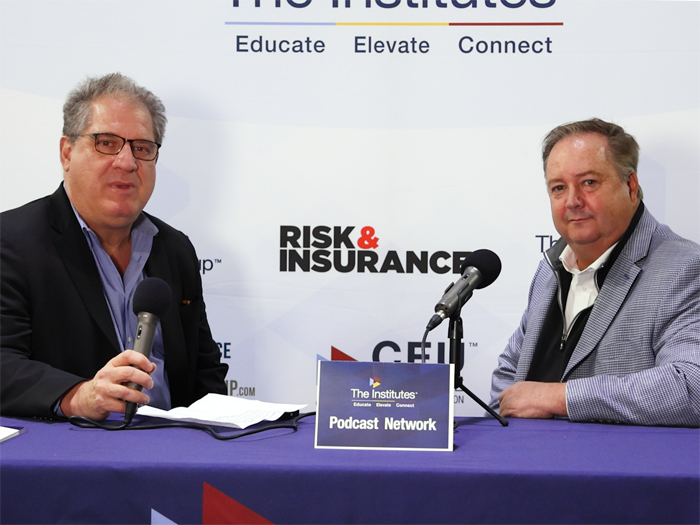Race and Insurance: What Insurance Commissioners Are Saying About It

When Ricardo Lara was a child in East Los Angeles, getting sick often led to a three-hour drive to a doctor in Tijuana, Mexico. That’s because his undocumented immigrant parents did not have health insurance.
“Ignorance is bliss, because I thought everybody did that,” said Lara.
Now the California Insurance Commissioner, Lara says the insurance industry needs to be more inclusive so people in all situations have access to coverage.
“We still struggle with these issues of access, equality and protecting our vulnerable communities. And so, I’m glad that we’re having these conversations,” he said. “And I think that is why expanding diversity in the insurance industry is a priority, and it should continue to be a priority.”
Lara shared his thoughts on a recent episode of the podcast The Regulators, Insurance Insights From Inside the NAIC. Joined by fellow insurance leaders, Lara and the group had a frank discussion about the lack of diversity in the industry, how underwriting algorithms can lead to bias, and potential solutions to the problem.
Dan Amos, CEO of Aflac, said that fair insurance practices start with diverse insurance organizations.
“There should never be unfair discrimination,” said Amos. “But the culture of the company can make sure it doesn’t happen — or at least they stop it if they see it happen.”
Amos said that Aflac’s workforce is 66% women, 35% African American and almost 50% minority. To keep those numbers moving in the right directions, Amos gets personally involved in diversity initiatives.
“They have to see you,” he said. “You have to show that [diversity’s] important, and at Aflac we make sure that our teams know that diversity is just as important as making the numbers and anything less is unacceptable.”
“We’ve Been to This Prom Before”
It’s fair to say that protests over the killing of George Floyd and others have gone beyond policing.
People want solutions to other systemic problems facing minorities and lower income individuals — like being underserved by insurance. In response, the industry appears ready to take some actionable steps.
Whether it will succeed is anything but certain.
“If your community is not represented, it will be ignored. And that’s why I think it is so important to the industry and to us as regulators that we all have a seat at the table.” — Andrew Mais, Insurance Commissioner, the state of Connecticut
“We’ve been to this prom before. The difference is we’re wearing different dresses and different sizes,” said Sonja Larkin-Thorne, chair of the Connecticut Insurance Department’s Advisory Council and Subcommittee on Big Data.
“When I started in this industry in 1974 in California, there really was a push by many companies to include diversity as part of their corporate culture. I have seen the decline in that commitment over the last 40 years.”
Early in her career, she said underwriters knew their customers and their communities. Now Big data, algorithms and artificial intelligence make underwriting decisions based on things like credit score, marital status or income.
For example, a study by the Consumer Federation of America found that Black Americans pay more for auto coverage than white drivers. And much of the data used to make those determinations is unverified.
How does she know? Larkin-Thorne learned that underwriting data claimed that she, a Black woman, gave birth to a Caucasian child.
“I believe in miracles, but I can guarantee you that did not happen,” said Larkin-Thorne. “This unverifiable Big Data used to develop these algorithms is discriminating. They include age. They include gender. They include income. They include many prohibitive practices that are unverified by the consumer. So, the accuracy is questionable.”
New Jersey Insurance Commissioner Marlene Caride didn’t mince words about insurance in her state: “We see situations here that can be unfair. Very unfair.”
But things are changing, particularly the passage of a law allowing drivers’ licenses to be issued to people regardless of immigration status.
Now, insurance companies are issuing coverage to them “regardless of their immigration status.” Companies can no longer “profile them and say, well, ‘because their immigration status is questionable, let’s charge them more,’ ” said Caride, who served in the New Jersey General Assembly from 2012 to 2018.
Connecticut is another place where inclusivity initiatives are top of mind. After Connecticut Insurance Commissioner Andrew Mais began his term last year, he realized the licensing exam was not available in Spanish and worked to get it translated.
“If your community is not represented, it will be ignored,” he said. “And that’s why I think it is so important to the industry and to us as regulators that we all have a seat at the table.”
In California, Lara’s department investigated auto insurance discounts, finding that they were offered disproportionately to white-collar occupations and highly skilled workers — adversely affecting drivers residing in zip codes with lower per capita incomes, lower levels of education attainment and larger underserved communities.
And that was 30 years after the passage of Proposition 103, a state law banning such practices.
“Many insurance companies were effectively using group discounts to cherry pick members, giving some higher income occupations essentially a fast pass, while people from certain racial and ethnic groups and lower income motorists were left in the slow lane,” said Lara.
Diversity Starts with Recruitment
As the industry attempts to gain more inclusivity, businesses should consider reaching out to more students at historically black colleges and universities, and convincing minority students everywhere about the positives of a career in insurance.
Intention is also crucial.
“We need people to be intentional about diversifying our departments, diversifying the industry, diversifying your company,” said Lara.
“And, yes, you’re going to get pushback. But stay the course, because through our diversity, not only do we improve the industry, we’re able to meet the needs of our diverse community.” &










